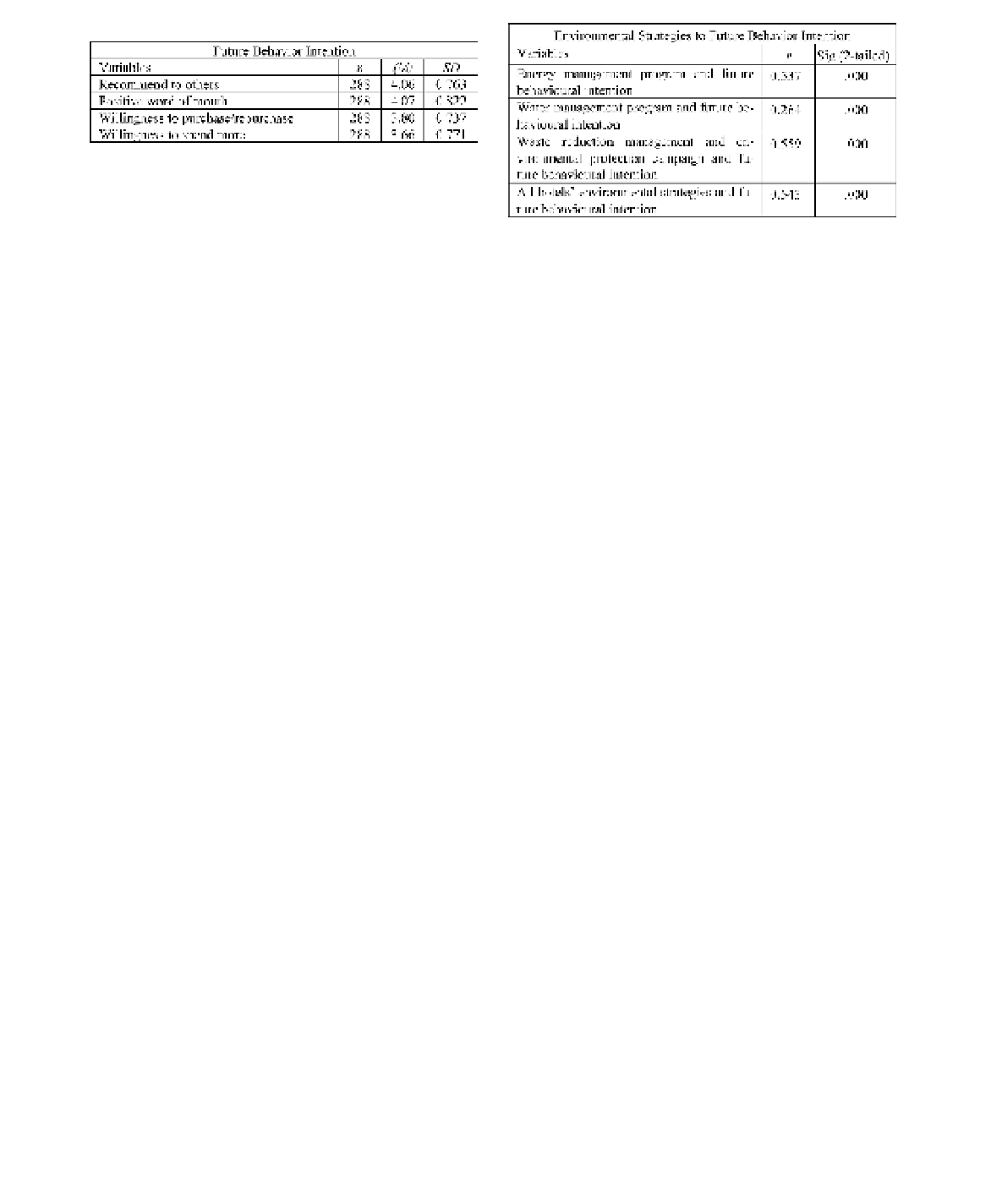Travel Reference
In-Depth Information
Table 2. Descriptive analysis for future behavior
intention.
Table 3.
Pearson correlation test.
Scale: 1
=
Strongly Disagree, 2
=
Disagree, 3
=
Moderate,
4
=
Slightly Agree, 5
=
Totally Agree.
**Correlation is significant at the .01 level (2-tailed).
respondents agreeing to not changing bed sheet
during a guest's stay (
M
= 3.53). Even fewer agreed
to not changing bath linens during their stay in
hotel. This may indicate that respondents were
unlikely to compromise cleanliness and personal
hygiene for meeting environmental goals.
A glance through the figures about respond-
ents' perception on waste reduction management
and environmental protection campaign in hotels
revealed that majority respondents were inclined
towards agreeing with all strategies listed. They
favored the idea of having recycle bin in guestroom
and public areas (
M
= 4.09); heavy promotion
about environmental awareness does not seem to
bother them (
M
= 4.09); willing to accept hotel's
brochure and promotion via email while printed
is made upon request (
M
= 4.05)
;
replacing hand-
towel tissue paper with automated hand dryer was
perceived positive (
M
= 4.03), even using reusable
items in food and beverage service was deemed
acceptable (
M
= 4.01). From another standpoint,
the strategy to offer complimentary newspapers
only at public areas as opposed to delivering
it to each guestroom were minimally favorable
(
M
= 3.97); maybe respondents perceived the ideas
as a cost saving approach benefiting the organi-
zation rather than the guests or they were make
inconvenienced as a result for supporting such
strategy. In similar gesture, using refillable ameni-
ties dispenser (
M
= 3.93); as well as offering special
parking entitlement to guest arriving with hybrid
vehicles (
M
= 3.77) were less favorable strategies.
Based on the three final items described, maybe
respondents were unlikely to accept a cutback and
discrimination of service delivery to uphold hotel's
environmental program.
others. Conversely, they were minimally attracted
to repurchase environmental friendly services
(
M
= 3.80) and even to spend extra (
M
= 3.66) to
support such practices.
4.4
Relationship between environmental strategies
towards future behavior intention
Table 3 revealed a significant correlation result
between energy management program and future
behavioral intention (sig. value
= .001 < .05) while
r
= 0.537 indicates strong positive relationship
coefficient of correlation value. Comparable result
was achieved for the relationship between waste
reduction/environmental protection campaign and
future behavioral intention; with slight differences
in values. Interestingly, the correlation between
water management program and future behavioral
intention was significant; yet coefficient correlation
value was minimal with
r
= 0.264,
p
< .001 indicat-
ing a moderate relationship. In general, there was a
significant correlation between all hotels' environ-
mental strategies and future behavioral intention
was achieved with strong relationship of coeffi-
cient correlation,
r
= 0.543,
p
< .001.
5 CONCLUSION
Overall, this study revealed that not all participat-
ing respondents were willing to accept suggested
strategies evenly. Therefore, any environmental
management strategy implemented in hotel should
be planned with care especially if it involves limi-
tation in individual's activity or preference. Based
on the findings, it was clear that respondents were
inclined to refuse strategies that compromise per-
sonal privacy, preferences and hygiene as well as
other fundamental individual needs. Respondents
were unlikely to support if the strategy is perceived
causing much inconvenience to them. Further-
more, any cutback and discrimination in service
delivery made in order to uphold hotel's environ-
mental program should be avoided; hence it is
4.3
Future behavior intention
Descriptive result for future behavior intention is
detailed in Table 2; overall score between 3.66 and
4.07 indicating respondents' minimal support with
all statements.
In general, majority respondents were willing
to spread positive word of mouth and recommend
hotels implementing environmental initiatives to




Search WWH ::

Custom Search